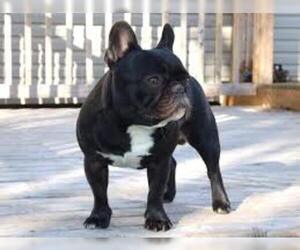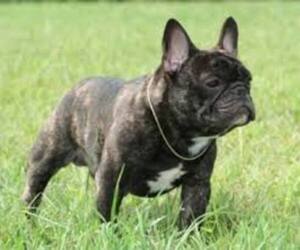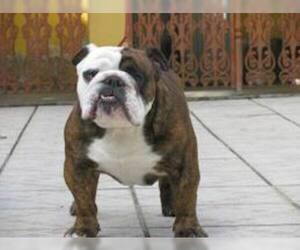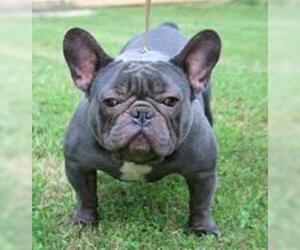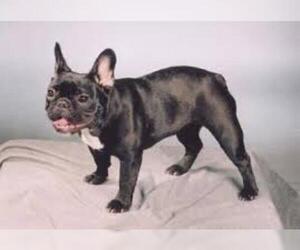
All about French Bulldog dog breed
A.K.A. :Frenchie, Bouledogue Français, Bouledogue, Bulldog Francés, Fransız Bulldog, Buldog Francuski, Französischer Bulldog, Franska Bulldoggen, Fransk Bulldog, Mini Bulldog, Batpig, Frogdog, Clown dog, Sofa Spud
Size
Grooming requirements
Exercise requirements
Good with other dogs
Watchdog ability
Energetic
Training requirements
Playful
Affectionate
Good with other pets
Good with children
Good with strangers
Winter
Summer
Healthiness
Protective
Life Span
| Pure Breeds | Member |
| Breeds A - Z | F |
| Breeds by Group | Companion Non-Sporting |
| Breeds by Trait | Good With Kids Low Shedding |
| Overview: | The French Bulldog, affectionately known as a "Frenchie," is a charming and compact companion breed originating from England, later popularized in France during the 19th century. Known for their distinctive "bat ears" and sturdy, muscular build, they possess a short, smooth coat that comes in various colors and patterns. Despite their somewhat serious expression, Frenchies boast an incredibly affectionate and playful temperament, making them excellent companions for individuals and families alike. Their relatively low exercise requirements and adaptability make them particularly well-suited for apartment living. However, prospective owners should be aware of their susceptibility to certain health considerations, including breathing difficulties due to their brachycephalic (short-nosed) structure, as well as spinal issues and skin allergies. With proper care and attention, a French Bulldog can bring years of joy and loving companionship. |
F.A.Q.
All You Need to Know About the French Bulldog Breed
The French Bulldog is a charming, compact companion, originally bred in England and later popularized in France. Known for their distinctive "bat ears" and muscular build, these delightful dogs possess a calm, affectionate temperament, making them excellent family pets and ideal for apartment living. They are generally good with children and other animals, thriving on human companionship. Their short, smooth coat requires minimal grooming, just a weekly brush, and their exercise needs are low – a short daily walk is sufficient. However, potential owners should be aware of common health concerns, including respiratory issues due to their brachycephalic (flat-faced) nature, and potential spinal problems. Despite these considerations, a French Bulldog brings immense joy and a lovable personality to any home, making them a consistently popular choice for those seeking a devoted and relatively low-maintenance canine friend.The average weight for a French Bulldog is between 20-28 pounds. Healthy adult males typically weigh 20-28 pounds, while females generally fall within the 16-24 pound range. This makes them a compact, sturdy breed, and maintaining a healthy weight for a French Bulldog is crucial for their well-being.
Wondering about the French Bulldog height or how tall is a French Bulldog? Here's what you need to know about their average size:
The average height of a French Bulldog is between 11 to 13 inches (measured at the shoulder). This compact and sturdy build is a hallmark of the breed. While there isn't a significant difference in height between males and females, males might occasionally be at the higher end of this range, or slightly stockier overall.Keep in mind that individual genetics play a role, so some French Bulldogs may fall slightly outside this typical range. Factors like parentage and overall lineage can influence a puppy's adult dimensions. When considering a French Bulldog, remember that their charming personalities are far bigger than their physical stature!The French Bulldog colors recognized by major kennel clubs like the AKC include brindle, fawn, white, and cream. These are considered the standard and most desirable for showing. Beyond these classic AKC recognized French Bulldog colors, there are several rare coat types and exotic French Bulldog variations that have emerged due to selective breeding. These include striking colors like blue (often appearing gray), lilac (a dilute chocolate with blue undertones), and chocolate. Other highly sought-after but non-standard patterns include merle, characterized by mottled patches of color, and "pied" variations of the aforementioned colors. While these exotic French Bulldog variations are visually appealing and popular with some buyers, it's important to note they are not accepted in the show ring by organizations like the AKC. Pricing for French Bulldogs can vary significantly based on these coat types, with rare and exotic colors often commanding higher prices.
The French Bulldog personality is renowned for being friendly, playful, and affectionate. They are exceptionally loyal companions, forming strong bonds with their families. This breed exhibits a highly sociable nature, generally getting along well with strangers and other pets when properly introduced and socialized. Their temperament of French Bulldog is notably adaptable, making them an excellent choice for apartment living due to their low exercise requirements and relatively quiet demeanor. They are typically good with children, possessing a patient and gentle disposition, though supervision is always recommended with very young children. With other pets, including other dogs and cats, French Bulldogs usually coexist peacefully, especially if raised together or introduced carefully. They thrive on companionship and are prone to separation anxiety if left alone for extended periods.
French Bulldog Temperament & PersonalityThe French Bulldog temperament is renowned for being affectionate, charming, and highly sociable, making them excellent companion dogs. They are generally very friendly with people, enjoying attention and a good cuddle. Frenchies are typically adaptable and thrive in apartment living due to their relatively low exercise needs and love for indoor comfort.They are known for their loyalty to their families and can form strong bonds, often following their owners from room to room. When it comes to children, French Bulldogs are usually patient and playful, making them good family pets, especially if properly socialized. Similarly, they tend to get along well with other pets, though early introductions are always recommended.While generally easygoing, the French Bulldog personality traits can include a streak of stubbornness. They are intelligent but can be strong-willed, requiring consistent, positive reinforcement training. They can also be sensitive to their owner's mood and respond best to gentle handling. Overall, their loving, humorous, and adaptable nature makes them a delightful addition to most households.
French Bulldog Care: Essential Daily Maintenance & Health TipsCaring for a French Bulldog involves understanding their unique needs. French Bulldog care is generally straightforward but requires consistent attention.Grooming: While their short coat is low-shedding, grooming needs include weekly brushing to remove loose hair. Their prominent "bat ears" typically self-clean, but a gentle wipe with a damp cloth may be needed occasionally. The most crucial grooming aspect is wrinkle and ear cleaning. Daily or every-other-day cleaning of their facial folds (wrinkles) is essential to prevent irritation, infection, and skin issues. Use a soft, damp cloth and ensure the folds are thoroughly dried afterward.Exercise: French Bulldogs are a low-energy dog breed with specific exercise limitations. Due to their brachycephalic (short-nosed) anatomy, they are prone to overheating and respiratory distress. Short, leisurely walks (15-20 minutes, 1-2 times daily) are sufficient. Avoid strenuous exercise, especially in hot or humid weather. Climate sensitivity is paramount; never leave a Frenchie unsupervised outdoors in extreme temperatures. They are best suited for indoor living.Dietary Considerations: Dietary considerations are vital for their health and weight management. Choose high-quality dog food appropriate for their age and activity level. French Bulldogs can be prone to allergies, so monitor for any adverse reactions to food. Overfeeding leads to obesity, exacerbating their breathing difficulties and joint problems. Weight management is key to a healthy life.Health & Wellness: Regularly check for common health tips for French Bulldog issues. Skin issues are common, including allergies and pyoderma (skin infections), often linked to moisture in their wrinkles. Dental care is crucial; daily brushing or dental chews can help prevent plaque and tartar buildup. Due to their compact build, some may experience spinal issues, so gentle handling is always recommended. Regular veterinary check-ups are essential for early detection and management of any health concerns. How to care for a French Bulldog effectively means being proactive about their specific health requirements.
French Bulldog Activity Level: Moderate to LowHow active are French Bulldogs? French Bulldogs have a moderate to low activity level, making them excellent companions for a variety of households. They are not high-energy dogs, balancing short bursts of playful energy with long periods of rest.Typical Energy Levels & Daily Exercise Needs: Your French Bulldog's exercise needs are minimal. They typically require 20-30 minutes of daily exercise, split into a couple of short walks. This helps maintain a healthy weight and provides mental stimulation. Intense or prolonged exercise is not suitable due to their brachycephalic (flat-faced) anatomy, which limits their ability to breathe efficiently and regulate body temperature.Playtime Preferences: French Bulldogs enjoy short, engaging play sessions with toys indoors or in a secure, shaded yard. Their playful nature makes them enjoy games of fetch or tug-of-war, but these should always be kept brief, especially in warm weather. Overheating is a significant concern for this breed.Limitations Due to Brachycephalic Anatomy: Due to their unique facial structure, French Bulldogs are prone to respiratory issues and heatstroke. Always supervise their activity, especially in hot or humid conditions, and avoid strenuous exercise. They are not suitable for jogging partners or long hikes.Suitability: French Bulldogs are suitable for low-energy households and individuals who prefer a more relaxed lifestyle. While they can adapt to active families, it's crucial that family members understand and respect their exercise limitations. They thrive in environments where they can enjoy comfortable lounging and short, fun playtimes rather than extensive physical demands. If you're looking for a breed with a manageable exercise needs and a calm demeanor, the French Bulldog is a great choice.
French Bulldog Health Issues: What You Need to Know
Potential French Bulldog owners should be aware of several common French Bulldog health problems stemming from their unique brachycephalic (flat-faced) anatomy. One of the most significant is Brachycephalic Obstructive Airway Syndrome (BOAS), which can cause breathing difficulties, snoring, and overheating. Symptoms range from mild to severe, sometimes requiring surgery.Other common French Bulldog medical issues include hip dysplasia, a genetic condition affecting the hip joints, and spinal problems like intervertebral disc disease (IVDD), which can lead to pain or paralysis. Their adorable wrinkles, while charming, can trap moisture and debris, leading to skin fold infections if not cleaned regularly. Many French Bulldogs also suffer from allergies, manifesting as itchy skin, ear infections, or digestive upset.Due to their short snouts and compromised breathing, heat sensitivity is a major concern. French Bulldogs can quickly overheat, even in moderately warm temperatures, leading to heatstroke. It's crucial to understand these brachycephalic dog care needs.To help manage these issues and learn how to keep French Bulldog healthy, ensure they have a cool environment, especially during warm weather. Regular cleaning and drying of skin folds are essential. Provide a high-quality diet and avoid overfeeding to maintain a healthy weight, which can lessen the strain on joints and spine. Regular veterinary check-ups are vital for early detection and management of potential problems. Be prepared for potential specialized veterinary care due to these breed-specific health challenges.Breed Breakdown: What Experts Say About the French Bulldog
I would rate the "Size" trait of the French Bulldog as a 3.While certainly not as small as a Chihuahua or a toy Poodle, French Bulldogs are undeniably a compact and sturdy breed. Their average height typically falls between 11 and 13 inches at the shoulder, and their weight ranges from 16 to 28 pounds, with males often being slightly larger. Their characteristic muscular and stocky build contributes to their moderate weight for their height, but they remain a small-to-medium sized dog in the broader canine spectrum, and notably small within the "companion dog" group. They are significantly smaller than breeds like Beagles, Cocker Spaniels, or even larger terrier breeds. This modest size makes them exceptionally well-suited for apartment living, frequent travel due to their manageability in carriers and cars, and households with space constraints. They don't require sprawling backyards and are often content with indoor play and short walks.
I would rate the French Bulldog's "Grooming Requirements" a 4 out of 10.While their short, smooth coat is extremely low-maintenance in terms of brushing – requiring only occasional wipes or a quick brush to remove loose hairs – several other factors bump their overall rating up slightly from a true "1." Their famous skin folds, particularly around the face and tail, require regular cleaning and drying to prevent moisture buildup, irritation, and potential infections. This is a non-negotiable part of their care that can't be overlooked. They are also prone to allergies and skin sensitivities, which can sometimes necessitate specialized shampoos or more frequent bathing if an issue arises, though generally, bathing is only needed every few weeks. Ear cleaning is fairly standard for most breeds, and while they don't have long, floppy ears prone to infections, a routine check and gentle cleaning are still important. Nail trimming is also a standard requirement for all dogs. So, while their coat is blissfully easy, the crucial attention to their skin folds and their general susceptibility to skin issues means they require more diligent and specific care than a truly "extremely low-maintenance" dog, but they are far from the demanding grooming needs of breeds with complex coats.
I would rate the French Bulldog's "Exercise Requirements" at a 2 out of 10.French Bulldogs have very low exercise needs due to their brachycephalic anatomy and generally laid-back temperament. Daily activity recommendations primarily involve short, leisurely walks – often just 15-20 minutes, once or twice a day – and indoor playtime. Their energy levels are typically low to moderate, and they have a very low tolerance for sustained movement or strenuous activity. Their shortened snouts make them highly susceptible to overheating and respiratory distress, especially in warm weather or during vigorous exercise, which means activities like jogging, long hikes, or any form of high-impact agility are generally ill-advised and potentially dangerous for the breed. While they enjoy a bit of playtime with toys, it's usually in short bursts. They thrive with minimal, controlled activity and do not require structured, demanding routines to stay healthy or mentally stimulated. In fact, over-exercising can be detrimental to their health.
I'd rate the French Bulldog's "Watchdog Ability" at a 5 out of 10.While French Bulldogs are generally alert to their immediate surroundings and can be surprisingly sensitive to changes in a household's atmosphere, their "watchdog" capabilities are more akin to a sensitive alarm system than a deterrent. They will absolutely bark at unfamiliar sounds or people approaching the door, and this barking can be surprisingly loud and insistent for their size. This serves as a very effective "early warning" system, letting you know someone is there. However, their territorial instincts are not typically aggressive, and their willingness to "deter" an intruder is quite low. They are far more likely to approach a stranger with curiosity or even a desire for attention once they've had a good bark, rather than a protective stance. They lack the imposing size, assertive demeanor, and protective drive needed to genuinely intimidate or deter someone with ill intent. Therefore, they are excellent at providing meaningful early warnings but are not effective as a protective guard dog.
I would rate the "Good with Other Dogs" trait of the French Bulldog breed a 7 out of 10.French Bulldogs generally have a friendly and amiable disposition, which extends to their interactions with other dogs. They are typically not prone to aggression or dominance and often enjoy the company of other canines, making them well-suited for multi-dog households. Their relatively low prey drive and sturdy build allow them to be quite adaptable with dogs of various sizes and energy levels, although their brachycephalic nature means they can't always keep up with high-energy play for extended periods. However, like any breed, proper socialization from a young age is crucial to ensure they maintain this agreeable nature. Without adequate exposure, some individuals may display shyness or mild apprehension, and while serious aggression is uncommon, careful introductions are always advisable, especially with unfamiliar dogs, to ensure a positive experience for everyone. They generally thrive in canine company, often seeking out other dogs for play and companionship, but they do require responsible ownership to facilitate peaceful coexistence through early and consistent positive reinforcement.
I would rate the "Energetic" trait of the French Bulldog breed as a 3.French Bulldogs are generally a very laid-back and low-energy breed compared to many other companion dogs. Their typical activity level is moderate at best, often preferring short bursts of play followed by extensive lounging. While they can be playful, especially as puppies, their endurance is quite low. They do not have a high need for intense physical stimulation; a few short walks a day and some indoor playtime are usually sufficient.Their brachycephalic (short-nosed) anatomy significantly affects their stamina and exercise tolerance. This unique facial structure makes them prone to breathing difficulties, especially in warm weather or during strenuous activity. Consequently, they are not suited for participation in prolonged outdoor or athletic activities. Overheating and respiratory distress are serious concerns for the breed, making high-energy endeavors risky and uncomfortable for them. Their natural inclination is more towards being a relaxed companion rather than an active one.
I'd rate the "Training Requirements" of the French Bulldog breed at a 6.French Bulldogs are generally of moderate intelligence, but their innate stubbornness and short attention spans can make training a more involved process than one might initially expect. While they are usually eager to please their owners, their desire to do so is often superseded by their desire to nap or simply be adored. They are sensitive dogs and respond best to positive reinforcement, but consistency is paramount. They can be easily distracted, so short, engaging training sessions are more effective than long, drawn-out ones. Their responsiveness to commands can vary greatly depending on their mood and the level of distraction in their environment.While they are not the most challenging breed to train, their occasional "selective hearing" and strong will mean they are not entirely beginner-friendly in the sense that they might quickly take advantage of an inconsistent or overly permissive owner. An experienced hand, or at least a highly dedicated and patient beginner who is committed to structured routines and consistent positive reinforcement, will find the most success. They don't require highly demanding or time-intensive training in the way a working breed might, but they do require more effort and strategic thinking than a naturally biddable breed.
I'd rate the French Bulldog's "Playful" trait a 7 out of 10. While not boundless like a Border Collie, they are far from inactive. Frenchies absolutely adore games and interaction, especially with their favorite people. They'll enthusiastically chase toys, engage in tug-of-war, and can be quite attention-seeking when they want to instigate play. Their zoomies, though short-lived, are legendary, and they love a good wrestle or a game of fetch (even if it's just for a few throws). They possess a naturally spirited, clownish personality that makes them very fun-loving and engaging, though their energy levels are generally moderate and they're quick to settle down for a nap. Compared to other companion dogs, they are definitely more on the playful side, but their physical limitations prevent them from sustained, high-energy activity.
I would rate the French Bulldog's "Affectionate" trait a 9 out of 10.French Bulldogs are renowned for their incredibly loving and people-oriented nature. They have an intense desire for human companionship and truly thrive on affection, often displaying a "velcro dog" mentality. Physical closeness is paramount to them; they are expert cuddlers and lap-sitters, always seeking to be in close proximity to their owners. Their loyalty is unwavering, and they are remarkably sensitive to owner emotions, often offering comfort or mirroring the mood of the household. It's common for them to follow family members from room to room, preferring to be involved in whatever their humans are doing. Compared to many other companion breeds, French Bulldogs are far from independent; they genuinely crave and flourish with constant interaction and love.
I'd rate the French Bulldog's "Good with Other Pets" trait a 7 out of 10.French Bulldogs are generally known for their amiable and easygoing nature, which extends to their interactions with other animals. They are typically quite sociable and, with proper early socialization, can coexist very peacefully with other dogs and even cats. Their prey drive is usually quite low compared to many other breeds, making them less likely to chase or harm smaller household pets. Resource guarding can occur, as it can with any breed, but it's not a defining characteristic of the French Bulldog and can often be mitigated with training and management.However, the "7" rather than a higher score reflects that while they are naturally inclined to be friendly, successful integration into a multi-pet household still requires training and supervision. They aren't universally good with all other pets without effort. Their sometimes stubborn nature means that consistency in training is key, especially when introducing them to new animal companions or managing potential resource guarding. Additionally, their smaller size and brachycephalic (flat-faced) nature mean they can be vulnerable to injury if paired with overly boisterous or large dogs, so careful introductions and supervision are always necessary for their safety. With a commitment to socialization and responsible pet ownership, a French Bulldog can be a wonderful and friendly addition to a multi-pet home.
I'd rate the French Bulldog's "Good with Children" trait a 9 out of 10.French Bulldogs are generally exceptionally child-friendly. Their patient, affectionate, and often comical temperament makes them excellent companions for children of various ages. They are typically very tolerant of noise and handling, making them less prone to reactivity in a busy family environment. While they enjoy playtime, they're not excessively boisterous, which can be a plus with smaller children. They are naturally gentle and possess a sweet disposition, often seeking out affection and snuggling. While all dogs benefit from proper socialization and supervision, especially with very young children, French Bulldogs require minimal specific training to thrive in a family setting; their inherent nature makes them highly compatible with kids.
I would rate the French Bulldog's "Good with Strangers" trait a 7 out of 10.French Bulldogs are generally quite friendly and adaptable dogs, but they aren't typically the boisterous, "everyone's my best friend" type right off the bat. They tend to be curious and willing to engage with unfamiliar adults, especially if the stranger approaches calmly and offers a gentle hand or a treat. Their charming and often comical demeanor usually disarms people, and they rarely show aggression or fear. While not prone to excessive barking at strangers, they might offer a few alert barks if someone approaches their home or family suddenly. With proper socialization from a young age, which involves positive exposure to various people and environments, they become very comfortable and welcoming in public or guest-filled settings. While naturally more outgoing than some more reserved breeds, training and early positive experiences are important to ensure they consistently display their best, most sociable selves with new people. Without early socialization, some individuals might exhibit a slight initial shyness, but it's usually easily overcome.
French Bulldogs rate a 2 for winter tolerance. Their very short, single coat provides minimal insulation, and while they can have some body fat, their small size and close proximity to the ground mean they lose heat rapidly. The most significant factor is their brachycephalic (short-nosed) anatomy. This makes it difficult for them to efficiently warm the air they breathe, increasing the risk of respiratory issues and making them more susceptible to hypothermia in cold temperatures. They are not built for cold weather and can quickly become dangerously chilled, even during brief outings. Compared to most other companion dogs, French Bulldogs require significant special care during winter, including protective clothing, extremely limited time outdoors, and vigilance against shivering or signs of discomfort to ensure their safety and well-being.
French Bulldogs rate a 1 for summer tolerance. Their extreme sensitivity to heat stems directly from their brachycephalic (short-nosed) anatomy, which severely compromises their ability to regulate body temperature through panting. This anatomical characteristic makes them highly inefficient at cooling themselves down compared to other dog breeds. As a result, French Bulldogs are at an exceptionally high risk of heatstroke, even in moderately warm temperatures. They require significant modifications to their outdoor activity levels during summer, often needing to avoid all but very short, early morning or late evening walks. Constant climate control indoors, typically air conditioning, is essential for their safety and comfort during hot weather. Therefore, they unequivocally require special, intensive care in summer months, far beyond what's necessary for most other companion dogs.
I would rate the "Healthiness" trait of the French Bulldog breed as a 2 out of 10.This rating reflects a breed with significant, widespread health challenges. French Bulldogs are notoriously prone to a multitude of severe health issues, largely due to their brachycephalic (short-nosed) conformation and a history of breeding practices that prioritized extreme physical traits over well-being. They commonly suffer from Brachycephalic Obstructive Airway Syndrome (BOAS), which can range from noisy breathing to life-threatening respiratory distress, often requiring corrective surgery. Beyond breathing, they are highly susceptible to intervertebral disc disease (IVDD) and other spinal problems, patellar luxation, hip dysplasia, and various skin fold dermatitis and allergy issues. Their average life expectancy, though sometimes cited as 10-12 years, is often impacted by these chronic conditions, and many individuals require extensive veterinary intervention throughout their lives. Despite the best efforts of responsible breeders and dedicated owners who provide preventive care, the inherent genetic predispositions make this breed consistently high-maintenance from a health perspective. They are generally considered one of the least robust companion dog breeds.
I would rate the "Protective" trait of the French Bulldog breed as a 3 out of 10.While French Bulldogs are incredibly loyal to their owners and certainly alert to changes in their environment, their protective instincts are primarily expressed through barking rather than physical intervention. They are quick to let you know a stranger is at the door, but their small size, affectionate nature, and lack of true guarding instincts make them unsuitable for any meaningful protection. They are far more likely to greet a friendly stranger with a wagging tail than to challenge them. Their territorial instincts are minimal beyond defending their favorite sleeping spot. Ultimately, the French Bulldog is a quintessential companion dog, excelling at offering love and entertainment, but not capable of offering physical protection in a household setting. They make good "alarm bells," but not guard dogs.
I'd rate the French Bulldog's "Life Span" trait as a 4.French Bulldogs are generally considered a short-lived breed compared to many other companion dogs. Their average life expectancy typically falls between 10 to 12 years, which is on the lower end of the canine spectrum. This shorter lifespan is significantly influenced by a host of breed-specific health issues stemming from their brachycephalic (flat-faced) structure and genetic predispositions. Common problems like Brachycephalic Obstructive Airway Syndrome (BOAS), intervertebral disc disease (IVDD), patellar luxation, various skin fold dermatitides, and a higher incidence of certain cancers and heart conditions can significantly impact their longevity and quality of life. While responsible breeding practices and diligent care can certainly mitigate some risks and extend a French Bulldog's life, these inherent vulnerabilities prevent them from being considered an average or long-lived breed.
French Bulldog Puppies for saleSee all puppies for sale
French Bulldog Dogs for adoptionSee all dogs for adoption
French Bulldog BreedersSee all breeders
Similar Dog Breeds for French Bulldog
Breed Mixes of French Bulldog
Quick Breed Selector 0 - not important, 1 - smallest, 10 - largest
Variants & Mistakes :Frenchbull dog, French buldog, French bulldogg, French bull dogg, French bulldogge, French buldogge, French bull dog, Frensh bulldog, Frech bulldog, Frenchie bulldog, Frenchie buldog, Frinch bulldog, Frinch buldog, Fench bulldog, Fench buldog, French bulldo, French bull do, French buldo, Frenchbulldog, Frenchbuldog, Frenchbulldogg, Frenchbuldogge, Frechbulldog, Frenshbulldog, Frinchbulldog, Fenchbulldog, Frenchiebulldog, Frenchi bulldog, Frenchie bulldo, Frenchi buldog, Frenchy bulldog, Frenchy buldog, Frenchy bulldogg, Frenchy buldogge, Frenchy bull dog, Frenchy bull dogg, Frenchy bull dogge, Frenchy buldo
